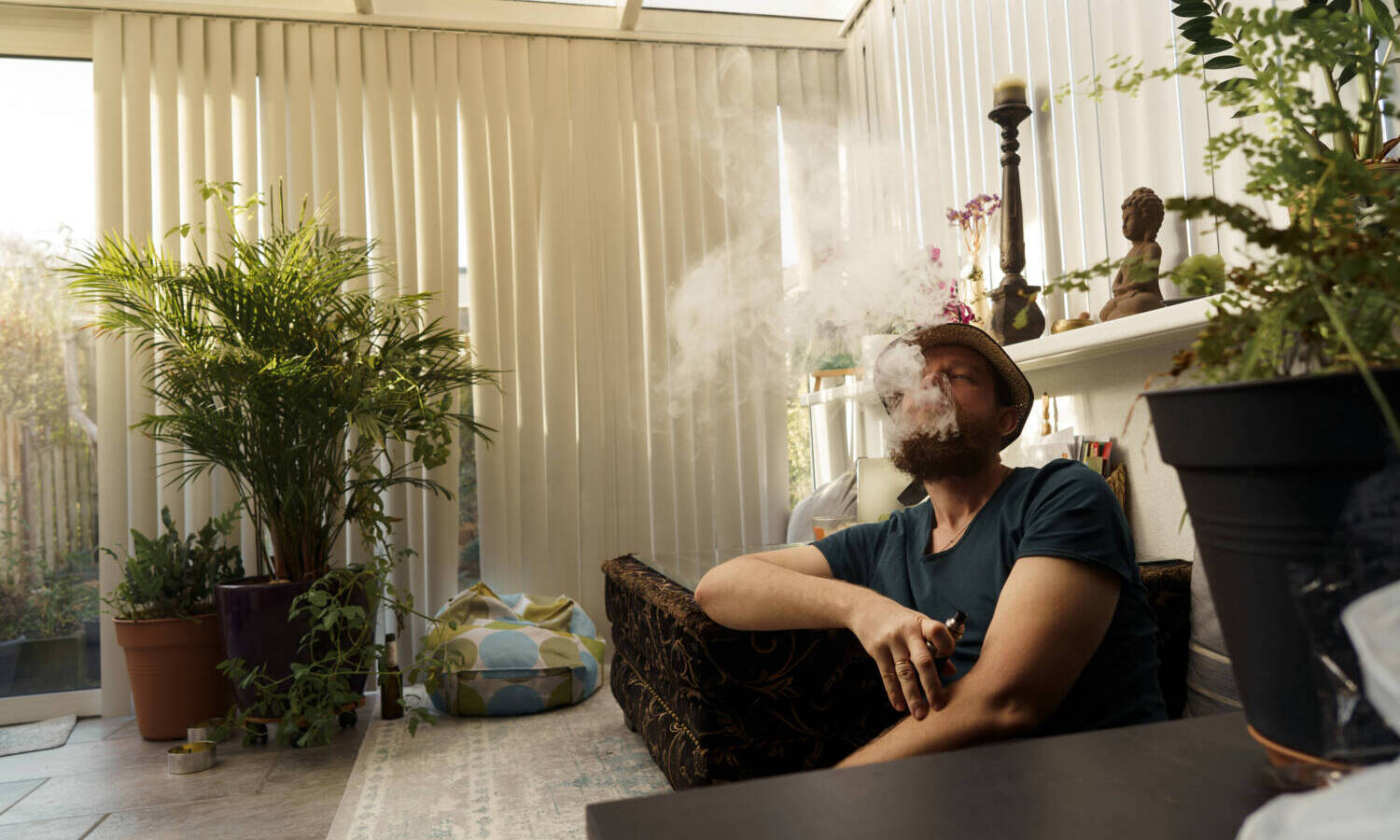Healthcare
How Weed And CBD Help You Relax — And How Much You Should Take

Essentially, a low dose of THC may suppress the release of glutamate in your brain, relaxing you. A higher dose of THC may suppress the release of GABA, leading to anxiety.
Relaxation is a state of low arousal in which you are not feeling any tension from anger, fear, or anxiety. Relaxation is important for health and wellbeing because it helps protect you from the negative effects of stress. Essentially, relaxation is “a process that decreases the effects of stress on your mind and body.”
According to the Mayo Clinic, nearly everyone can benefit from learning relaxation techniques. Breathwork and meditation are common relaxation techniques, as is drinking herbal tea or using aromatherapy.
In the first set of relaxation techniques, you are interacting with your autonomic nervous system to lower your state of arousal. In the second set of relaxation techniques, you are using natural compounds to promote feelings of relaxation. These natural compounds could be anything from lavender or chamomile, to cannabis or CBD.
Interestingly, the compound in lavender that relaxes you is called linalool, which is a terpene that you can find in various cannabis strains.
What does it look like to use cannabis or CBD to help you relax?
It could be a weekend warrior who uses a 1:1 THC:CBD tincture most nights to relax after working at a high-stress job, taking care of the kids, and maintaining a rigorous training schedule. Or a yoga practitioner staying healthy at 70 by using CBD oil to amplify the relaxation brought on by her yoga nidra meditations. Or a young couple who shares a joint before bowling night to relax and be more present in the moment.
Does Weed Help You Relax?
What is the difference between using weed to relax and using weed to relieve stress? While stress relief and relaxation are interrelated concepts, we are drawing a distinction between these two goals.
When you use weed to relieve stress, you are bringing yourself from a state of mild physical or emotional discomfort, anxiety, or unpleasantness to a normal state. When you use weed to relax, you are in a normal state, and you are using cannabis to banish any remaining tension and sink into a state of deep calm and relaxation. Of course, many Jointly users want to relieve stress and relax at the same time, so these experiences are often chosen together.
So, does weed help you relax? Weed is well-known to produce feelings of calm and relaxation at low doses. According to a joint study from University of Chicago and University of Illinois in Chicago, a low dose of cannabis significantly reduced feelings of stress and promoted feelings of relaxation in healthy subjects. But a slightly higher dose increased feelings of stress.
Higher doses of cannabis may not relax you, as THC has a biphasic response in which low doses relieve stress and promote feelings of relaxation, while high doses may increase stress or even make you paranoid. In general, side effects from cannabis can be mitigated by taking the minimum effective dose you need to get the results you want.
Does Weed Relax Muscles?
Muscle tightness and cramps can be caused by some common medications, by dehydration, or by overexerting yourself. Tight muscles and cramps can be painful and unpleasant, but there is some evidence that weed helps relax tight muscles. Most of the research on how weed affects tight or spasming muscles has been done on multiple sclerosis. While medical marijuana may be part of the treatment plan for multiple sclerosis, we are discussing using weed relax tight muscles from the wear and tear of daily life.
Muscle spasms are thought to originate in areas of the brain that control movement, and several of these sites contain high concentrations of endocannabinoid receptors. While the exact mechanisms by which cannabis alters movement haven’t been teased out, the way cannabis affects these brain areas likely plays a role in why so many people find that weed relaxes tight muscles.

Why Does Weed Help You Relax?
We have determined that a low dose of cannabis may promote feelings of relaxation and that weed does relax muscles, but why does weed help you relax? Weed is great for relaxing because of the wide variety of psychoactive effects produced by cannabis. Remember that the definition of relaxation is a state in which you are free from negative emotion, which allows you to have greater resilience when you are experiencing stress.
Cannabis promotes feelings of relaxation by decreasing feelings of stress and anxiety, elevating your mood, uplifting and energizing your mind, and keeping you occupied in the present moment. Together, this combination makes cannabis a highly effective relaxation tool. To learn all about the different ways cannabis helps relieve mild daily stress or how weed uplifts and energizes your mind, click those links!
But here is a quick overview of why cannabis helps you relax:
Cannabis produces its effects when molecules called cannabinoids interact with your endocannabinoid system (ECS). The ECS is a “ubiquitous system that provides homeostatic balance to the nervous and immune systems, as well as many other organ systems.” The ECS plays a role in modulating everything from sleep, to mood, to appetite, which is why cannabis can produce such a wide range of effects.
The ECS is composed of the endogenous ligands (AEA and 2-AG) also known as endocannabinoids, their receptors (CB1 and CB2), and the enzymes that degrade and recycle the ligands. Ligands and receptors are like keys and locks. When the ligand binds to the receptor, it produces a signal in the cell. To understand why cannabis has such a relaxing effect, we need to zoom in a little bit on how THC affects the brain.
A Deep Dive On Why Weed Relaxes You
Most psychoactive effects from cannabis come from THC interacting with CB1 receptors in your brain. Within the brain, CB1 receptors are expressed on GABAergic, glutamatergic, serotonergic, noradrenergic, and dopaminergic axon terminals. An axon terminal is the end of a nerve fiber that holds neurotransmitters and releases them across the synapse to the target cell. GABA, glutamate, serotonin, noradrenaline, and dopamine are neurotransmitters.
Neurotransmitters are chemical messengers that are released from the axon terminal of a neuron and trigger changes in the target cell.
When you ingest THC, “activation of these [CB1] receptors results in a robust suppression of neurotransmitter release into the synapse.” In other words, THC interacts with CB1 receptors on axon terminals, which suppresses the release of neurotransmitters. Glutamate is the primary excitatory neurotransmitter and GABA is the primary inhibitory neurotransmitter, and “the equilibrium between GABAergic and glutamatergic transmission provides an appropriate emotional reactivity.” Basically, GABA helps you feel calm, and glutamate stimulates your brain.
CB1 receptors are widely expressed on GABAergic neurons and, to a lesser extent, on glutamatergic neurons. Scientists have proposed that “low THC doses…act preferentially on glutamatergic neurons, whereas high THC doses have been proposed to act also at GABAergic neurons.”
Essentially, a low dose of THC may suppress the release of glutamate in your brain, relaxing you. A higher dose of THC may suppress the release of GABA, leading to anxiety. This reality may explain why cannabis has biphasic effects, promoting relaxation in low doses, but sometimes increasing anxiety in high doses.

Meditating While High
One of the best ways to relax is to combine your favorite relaxation technique with cannabis. For example, you could try meditating while high. You might wonder, does weed help with meditation? Can you meditate while high?
As you might expect, the best way to enhance your meditation practice with marijuana is to microdose. High doses of cannabis are more likely to cause anxiety or disorientation, which may make it difficult to meditate while high.
RELATED: 5 Tips To Ensure The Perfect High Meditation
Some people find that weed helps them meditate because it helps them stay present in the moment. When mindfulness practitioners are tuning into their environment, they listen to the sounds around them, they feel the breeze on their skin, they smell the air—they tune in to their sensory perceptions and the world around them.
Cannabis is well-known to increase your sensory perception, possibly amplifying your connection to the present moment. If you want to supercharge your relaxation, try meditating while high.
Does CBD Relax You?
Many people find CBD to be more relaxing than THC. While CBD is a cannabinoid like THC, it exerts its effects through different mechanisms of action.
Research has shown that CBD can affect the serotonin system and the ECS in ways that may promote relaxation. For example, levels of the endocannabinoid AEA are correlated with feelings of relaxation, and CBD has been shown to elevate levels of the AEA by inhibiting the enzymes that break it down.
You can incorporate CBD into your relaxation practice in lots of creative ways. For example, you could massage a CBD balm into your feet before taking a relaxing walk. Or you could take a CBD oil capsule before your meditation session. Or you could take a few puffs of a high CBD strain before taking a bath. Both full-spectrum CBD and isolate CBD bolster your endocannabinoid system and can promote feelings of relaxation. Please note that CBD is not an FDA approved treatment for stress and anxiety disorders and we are discussing using CBD to improve your general well-being.
How Much CBD to Relax?
How much CBD do you need to take to relax? CBD has a good safety profile and is well-tolerated in most people from doses of 5mg to 500mg. Of course, everyone is different. The way CBD affects you might not be the same as another person. The best way to find out how much CBD you need to relax is to experiment with different dosages and CBD products and record your experiences on the Jointly app.
Best Weed Strains to Relax
If you have been inspired to add cannabis to your relaxation toolkit, you might be wondering what is the best marijuana strain to relax and mellow out? If you search online, you will find recommendations about Blue Dream, OG Kush—potent, high-THC strains that have a significant psychoactive effect. But before you choose your relaxing weed strain, we encourage you to look at our article Why Jointly is Better than a Strain Finder. In that article, you will learn what strain names really mean and how to use Jointly to discover the most effective products in your area.

How to Use Weed and CBD to Relax
For many people, cannabis and CBD are the perfect tools to enhance their relaxation. If you want to see if cannabis or CBD can help you relax, use the Jointly app to track and optimize the 15 factors that can impact your weed experience. These 15 factors include your dose, the environment in which you consume cannabis, who you are with when you ingest, how hydrated you are, the quality of your diet, how much sleep you got last night, and more.
Jointly is a cannabis wellness platform that helps you achieve your wellness goals with cannabis and CBD. Perhaps you will discover that you feel the most relaxed when you eat a 1:1 weed gummy in the afternoon, after a hard workout.
Our data indicates that Jointly works best when you report at least 10 cannabis sessions. If you only fill out a few reports and then stop, you won’t have enough data to start to see trends and improve how you consume cannabis.
When you use Jointly, you are rating how well a product helped you achieve your wellness goals. Over time, your average ratings should go up as you optimize how you consume cannabis and CBD. Use the Results Tracker feature to make sure your results are improving over time.
How to Find Cannabis and CBD Products for Relaxation
Looking for products that can help relax? Brands and manufacturers have designed a vast range of legal cannabis and CBD products for this exact purpose: lemon balm-infused CBD gummies, vape pens with relaxing blends of terpenes, CBD-rich bath bombs and more. But how do you know if these products actually work? Jointly’s Product Finder feature allows you to look up legal, licensed cannabis and CBD products in your state based on your wellness goals. Select Relaxation and see how other users like you rated a product on a scale from 1-10, based on how well it helped them relax. By reporting your cannabis and CBD consumption, you are contributing important data to the Jointly community and helping Jointly make better product and routine recommendations for you.
Download the Jointly app on the App Store or the Google Play Store to get started on your cannabis wellness journey.
Sam Anderson is the content Director at Jointly, a cannabis wellness company powered by a proprietary data platform to help people reach their full potential. The company was created on the premise that purposeful cannabis consumption is the key to unlocking a better you. This article originally appeared on Jointly and has been reposted with permission.
Source: https://thefreshtoast.com/cannabis/how-weed-and-cbd-help-you-relax-and-how-much-you-should-take/
Business
New Mexico cannabis operator fined, loses license for alleged BioTrack fraud

New Mexico regulators fined a cannabis operator nearly $300,000 and revoked its license after the company allegedly created fake reports in the state’s traceability software.
The New Mexico Cannabis Control Division (CCD) accused marijuana manufacturer and retailer Golden Roots of 11 violations, according to Albuquerque Business First.
Golden Roots operates the The Cannabis Revolution Dispensary.
The majority of the violations are related to the Albuquerque company’s improper use of BioTrack, which has been New Mexico’s track-and-trace vendor since 2015.
The CCD alleges Golden Roots reported marijuana production only two months after it had received its vertically integrated license, according to Albuquerque Business First.
Because cannabis takes longer than two months to be cultivated, the CCD was suspicious of the report.
After inspecting the company’s premises, the CCD alleged Golden Roots reported cultivation, transportation and sales in BioTrack but wasn’t able to provide officers who inspected the site evidence that the operator was cultivating cannabis.
In April, the CCD revoked Golden Roots’ license and issued a $10,000 fine, according to the news outlet.
The company requested a hearing, which the regulator scheduled for Sept. 1.
At the hearing, the CCD testified that the company’s dried-cannabis weights in BioTrack were suspicious because they didn’t seem to accurately reflect how much weight marijuana loses as it dries.
Company employees also poorly accounted for why they were making adjustments in the system of up to 24 pounds of cannabis, making comments such as “bad” or “mistake” in the software, Albuquerque Business First reported.
Golden Roots was fined $298,972.05 – the amount regulators allege the company made selling products that weren’t properly accounted for in BioTrack.
The CCD has been cracking down on cannabis operators accused of selling products procured from out-of-state or not grown legally:
- Regulators alleged in August that Albuquerque dispensary Sawmill Sweet Leaf sold out-of-state products and didn’t have a license for extraction.
- Paradise Exotics Distro lost its license in July after regulators alleged the company sold products made in California.
Golden Roots was the first alleged rulebreaker in New Mexico to be asked to pay a large fine.
Source: https://mjbizdaily.com/new-mexico-cannabis-operator-fined-loses-license-for-alleged-biotrack-fraud/
Business
Alabama to make another attempt Dec. 1 to award medical cannabis licenses

Alabama regulators are targeting Dec. 1 to award the first batch of medical cannabis business licenses after the agency’s first two attempts were scrapped because of scoring errors and litigation.
The first licenses will be awarded to individual cultivators, delivery providers, processors, dispensaries and state testing labs, according to the Alabama Medical Cannabis Commission (AMCC).
Then, on Dec. 12, the AMCC will award licenses for vertically integrated operations, a designation set primarily for multistate operators.
Licenses are expected to be handed out 28 days after they have been awarded, so MMJ production could begin in early January, according to the Alabama Daily News.
That means MMJ products could be available for patients around early March, an AMCC spokesperson told the media outlet.
Regulators initially awarded 21 business licenses in June, only to void them after applicants alleged inconsistencies with how the applications were scored.
Then, in August, the state awarded 24 different licenses – 19 went to June recipients – only to reverse themselves again and scratch those licenses after spurned applicants filed lawsuits.
A state judge dismissed a lawsuit filed by Chicago-based MSO Verano Holdings Corp., but another lawsuit is pending.
Source: https://mjbizdaily.com/alabama-plans-to-award-medical-cannabis-licenses-dec-1/
Business
Pot Odor Does Not Justify Probable Cause for Vehicle Searches, Minnesota Court Affirms

The Minnesota Supreme Court affirmed that cannabis odor does not constitute probable cause to search a vehicle.
If Minnesota police search a vehicle solely based upon the smell of pot, they can’t justify searching a vehicle, even if there is evidence found of other alleged crimes. Even after appealing a lower court decision to suppress the evidence—twice—the Minnesota Supreme Court agreed, and the dismissal of his charges stands.
In a ruling filed regarding a case the State of Minnesota Court of Appeals on Sept. 13, the Minnesota Supreme Court affirmed that cannabis odor does not constitute probable cause to search a vehicle.
The case has been ongoing for two years. On July 5, 2021, just before 10 p.m., a Litchfield police officer stopped a car for an obscure local law: the light bar mounted on the vehicle’s grill had more auxiliary driving lights than are permitted under Minnesota law. The officer asked the driver, Adam Lloyd Torgerson, for his license and registration. Torgerson, his wife, and his child were present in the vehicle. The officer stated that he smelled pot and asked Torgerson if there was any reason for the odor, which he initially denied. But cops found a lot more than just pot.
A backup officer was called in. The couple denied possessing any pot, but Torgerson admitted to smoking weed in the past. The second officer stated that the weed odor gave them probable cause to search the vehicle and ordered them to exit the vehicle. The first officer searched the vehicle and found a film canister, three pipes, and a small plastic bag in the center console. The plastic bag contained a white powder and the film canister contained meth, which was confirmed in a field test.
Torgenson was charged with possession of meth pipe in the presence of a minor and fifth-degree possession of a controlled substance after the unwarranted search of Torgerson’s vehicle.
Police Aren’t Allowed to Do That, Multiple Courts Rule
But the search had one major problem—cops weren’t searching for a meth pipe. They only searched his car because they could smell pot, and the meth and paraphernalia were a surprise for everyone. Still, they had no grounds to search the vehicle. The man’s charges were later dismissed after the district court determined the odor of cannabis alone was insufficient basis for probable cause to search the vehicle, regardless of whatever other drug paraphernalia they found.
The state appealed the case, but the Minnesota Court of Appeals affirmed the district court’s decision. The case was appealed a second time, this time to the Minnesota Supreme Court, which agreed with the lower court’s ruling.
“This search was justified only by the odor of marijuana emanating from the vehicle,” the Minnesota Supreme Court decision reads. “Torgerson moved to suppress the evidence found during the search, arguing that the odor of marijuana, alone, is insufficient to create the requisite probable cause to search a vehicle under the automobile exception to the warrant requirement. The district court granted Torgerson’s motion, suppressed the evidence, and dismissed the complaint. The State appealed. The court of appeals affirmed the district court’s suppression order. Because we conclude that the odor of marijuana emanating from a vehicle, alone, is insufficient to create the requisite probable cause to search a vehicle under the automobile exception to the warrant requirement, we affirm.”
It amounts to basic human rights that apply—regardless of whether or not a person is addicted to drugs.
Other States do Precisely the Same Regarding Pot Odor as Probably Cause
An Illinois judge ruled in 2021 that the odor of cannabis is not sufficient grounds for police to search a vehicle without a warrant during a traffic stop.
Daniel J. Dalton, Associate Judge of the 14th Judicial Circuit, issued a ruling in response to a motion to suppress evidence in the case of Vincent Molina, a medical cannabis patient arrested for cannabis possession last year.
In that case, Molina was arrested despite the decriminalization of small amounts of cannabis in Illinois in 2019 with the passage of the Illinois Cannabis Regulation and Tax Act.
In some states, the issue of probable cause and cannabis was defined through bills.
Last April, the Maryland House of Delegates approved a bill that reduces the penalties for public cannabis consumption and bars police from using the odor of cannabis as the basis for the search of an individual or auto. Under Maryland’s House Bill 1071, law enforcement officers would be prohibited from using the odor of raw or burnt cannabis as probable cause to search a person or vehicle.
The rulings represent the rights of citizens when they are pulled over by police, even if there are hard drugs involved.
-

 Business2 years ago
Business2 years agoPot Odor Does Not Justify Probable Cause for Vehicle Searches, Minnesota Court Affirms
-

 Business2 years ago
Business2 years agoNew Mexico cannabis operator fined, loses license for alleged BioTrack fraud
-

 Business2 years ago
Business2 years agoAlabama to make another attempt Dec. 1 to award medical cannabis licenses
-

 Business2 years ago
Business2 years agoWashington State Pays Out $9.4 Million in Refunds Relating to Drug Convictions
-

 Business2 years ago
Business2 years agoMarijuana companies suing US attorney general in federal prohibition challenge
-

 Business2 years ago
Business2 years agoLegal Marijuana Handed A Nothing Burger From NY State
-

 Business2 years ago
Business2 years agoCan Cannabis Help Seasonal Depression
-

 Blogs2 years ago
Blogs2 years agoCannabis Art Is Flourishing On Etsy





